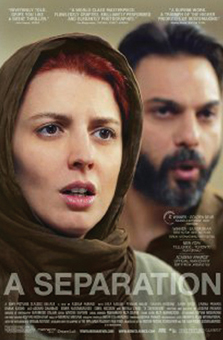Directed by Asghar Farhadi (Sony Pictures, 2011)
 We all tell stories, and we all believe our stories are true. But the small gaps between our stories and the truth can become chasms in a universe where things fall apart.
We all tell stories, and we all believe our stories are true. But the small gaps between our stories and the truth can become chasms in a universe where things fall apart.
Asghar Farhadi’s Oscar-winning foreign film starts with a middle-class Iranian couple petitioning the court for a divorce, but that is not where their story—or stories—began. Eighteen months before, Nader (Peyman Moadi) and his wife, Simin (Leila Hatami), had begun petitioning the government for permission to move abroad, hoping to provide a better life for their 11-year-old daughter, Termeh (Sarina Farhadi). Nearing the end of the exasperating bureaucratic odyssey, Nader decides not to leave the country because he cannot imagine abandoning his father who is suffering from Alzheimer’s.
The Iranian courts will not grant Simin a divorce or Termeh a visa without Nader’s consent, which he will not give. So Simin and their daughter move in with her parents and Nader must find someone to care for his sick father.
But Razieh (Sareh Bayat), the pious working-class woman Nader hires, is overwhelmed by the challenges of taking care of another man’s father and has not told Nader or her own husband the whole truth of her situation. Soon Nader, who sees himself as a man trying to do the right thing, finds himself back in court in a conflict with Razieh’s husband, who has a similar vision of his own virtue.
There are no villains in Farhadi’s nuanced and compassionate tale, only decent, imperfect human beings who occasionally retreat into their own stories as a defense against judgment and misunderstanding, places where they are the heroes.But in a world where all of us are misunderstood heroes it is too hard to hold families and communities together.
This article appeared in the May 2012 issue of U.S. Catholic (Vol. 77, No. 5, page 42).














Add comment